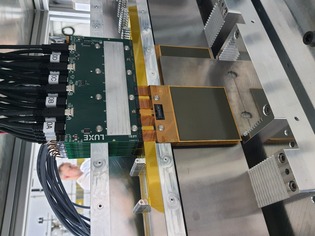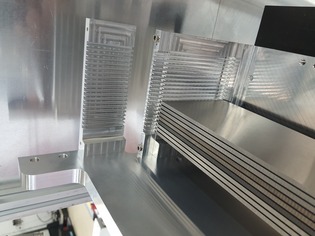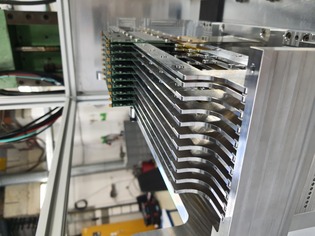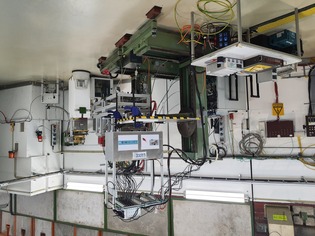Step towards a boiling of vacuum
2025-07-11
The Faculty of Physics at the University of Warsaw is a member of the international LUXE (Laser Und XFEL Experiment) Collaboration. The project involves a groundbreaking experiment in the Eu.XFEL laboratory in Hamburg. It aims to study the Quantum Electrodynamic (QED) in the regime of very strong fields.
During the experiment, a high-power laser beam (350 TW) is planned to collide with a high-energy electrons (16.5 GeV). As a result of this collision, an electric field with an intensity exceeding the critical value of 1018 V/m will be generated for the first time under laboratory conditions. In such strong fields, spontaneous creation of electron-positron pairs (e⁻ e⁺) occurs, A phenomenon known as “tunneling out of vacuum”. Depending on the intensity of the laser beam, more than a million particle pairs can be created in a single collision. A so-called “boiling of vacuum” then occurs in the laser focal point.
One of the key elements of the preparation for the LUXE experiment was the testing of a prototype high-density electromagnetic calorimeter, ECAL-P, designed to precisely measure the energy and spectra of positrons produced during collisions. The tests were carried out in June 2025 on a test beam at the DESY facility in Hamburg.
The sandwich structure of the calorimeter consists of several layers of 3.5 mm-thick tungsten absorber plates interleaved with 320 micron-thick silicon sensors. The Faculty of Physics, University of Warsaw, is responsible for the design and construction of all mechanical components of the calorimeter, including high precision support for the tungsten absorber and silicon sensors.

Three employees of our Faculty, Dr. Grzegorz Grzelak, Dr. Piotr Zbińkowski and Prof. Aleksander Filip Żarnecki, together with 20 members of the international team collaborating on the project, took part in testing the calorimeter. The major components of the calorimeter: silicon sensors and its kapton interface, front end and readout electronic and mechanical infrastructure has been successfully tested. During the week-long testing we collected approximately 30 TB of data containing more than 300 million events, single electron tracks in stand-alone silicon sensors and electromagnetic cascades in the full calorimetric mode. The collected material provides a valuable data set for evaluating the performance of the prototype and its further development.
Institutions Participating to the LUXE ECAL-P project:
- Faculty of Physics, University of Warsaw, Warsaw, Poland
- Faculty of Physics and Applied Computer Science, AGH University of Krakow, Krakow, Poland
- IFIC, Universitat de Valencia and CSIC, Paterna, Spain
- Institute of Space Science (ISS), Bucharest, Romania
- Tel Aviv University, Tel Aviv, Israel
- Deutsches Elektronen-Synchrotron DESY, Hamburg, Germany
More info:
LUXE Technical Design Report LUXE Collaboration, Abramowicz, H., Almanza Soto, M. et al. Technical Design Report for the LUXE experiment. Eur. Phys. J. Spec. Top. 233, 1709–1974 (2024). https://doi.org/10.1140/epjs/s11734-024-01164-9








